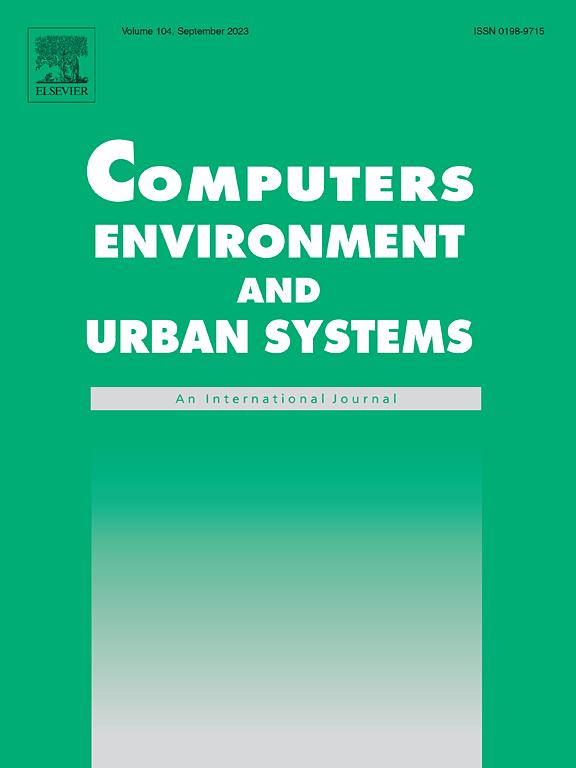From 3D pedestrian networks to wheelable networks: An automatic wheelability assessment method for high-density urban areas using contrastive deep learning of smartphone point clouds
IF 8.3
1区 地球科学
Q1 ENVIRONMENTAL STUDIES
Computers Environment and Urban Systems
Pub Date : 2025-02-05
DOI:10.1016/j.compenvurbsys.2025.102255
引用次数: 0
Abstract
This paper presents a contrastive deep learning-based wheelability assessment method bridging street-scale smartphone point clouds and a city-scale 3D pedestrian network (3DPN). 3DPNs have been studied and mapped for walkability and smart city applications. However, the city-level scale of 3DPN in the literature was incomplete for assessing wheelchair accessibility (i.e., wheelability) due to omitted pedestrian paths, undetected stairs, and oversimplified elevated walkways; these features could be better represented if the mapping scale was at a micro-level designed for wheelchair users. In this paper, we reinforced the city-scale 3DPN using smartphone point clouds, a promising data source for supplementing fine-grain details and temporal changes due to the centimeter-level accuracy, vivid color, high density, and crowd sourcing nature. The three-step method reconstructs pedestrian paths, stairs, and slope details and enriches the city-scale 3DPN for wheelability assessment. The experimental results on pedestrian paths demonstrated accurate 3DPN centerline position (mIoU = 88.81 %), stairs detection (mIoU = 86.39 %), and wheelability assessment (MAE = 0.09). This paper contributes an automatic, accurate, and crowd sourcing wheelability assessment method that bridges ubiquitous smartphones and 3DPN for barrier-free travels in high-density and hilly urban areas.
从3D步行网络到轮式网络:基于智能手机点云对比深度学习的高密度城市地区轮式自动评估方法
本文提出了一种基于深度学习的轮性对比评估方法,将街道尺度的智能手机点云和城市尺度的三维行人网络(3DPN)相结合。已经研究并绘制了用于步行性和智慧城市应用的3dpn。然而,由于忽略了行人通道、未检测到的楼梯和过度简化的高架人行道,文献中3DPN的城市级尺度在评估轮椅可及性(即轮行性)方面是不完整的;如果为轮椅使用者设计的地图比例尺在微观层面上,这些特征可以更好地表现出来。在本文中,我们使用智能手机点云来增强城市规模的3DPN,由于其厘米级的精度、鲜艳的颜色、高密度和众包的性质,这是一个很有前景的数据源,可以补充细粒度细节和时间变化。三步法重构行人路径、楼梯和斜坡细节,丰富城市尺度的3DPN可轮性评价。在行人道路上的实验结果表明,该系统能够准确定位3DPN中心线(mIoU = 88.81%)、识别楼梯(mIoU = 86.39%)和评估轮毂能力(MAE = 0.09)。本文提出了一种自动、准确、众包的轮毂性评估方法,将无处不在的智能手机和3DPN连接起来,用于高密度丘陵城市地区的无障碍出行。
本文章由计算机程序翻译,如有差异,请以英文原文为准。
求助全文
约1分钟内获得全文
求助全文
来源期刊

Computers Environment and Urban Systems
Multiple-
CiteScore
13.30
自引率
7.40%
发文量
111
审稿时长
32 days
期刊介绍:
Computers, Environment and Urban Systemsis an interdisciplinary journal publishing cutting-edge and innovative computer-based research on environmental and urban systems, that privileges the geospatial perspective. The journal welcomes original high quality scholarship of a theoretical, applied or technological nature, and provides a stimulating presentation of perspectives, research developments, overviews of important new technologies and uses of major computational, information-based, and visualization innovations. Applied and theoretical contributions demonstrate the scope of computer-based analysis fostering a better understanding of environmental and urban systems, their spatial scope and their dynamics.
 求助内容:
求助内容: 应助结果提醒方式:
应助结果提醒方式:


